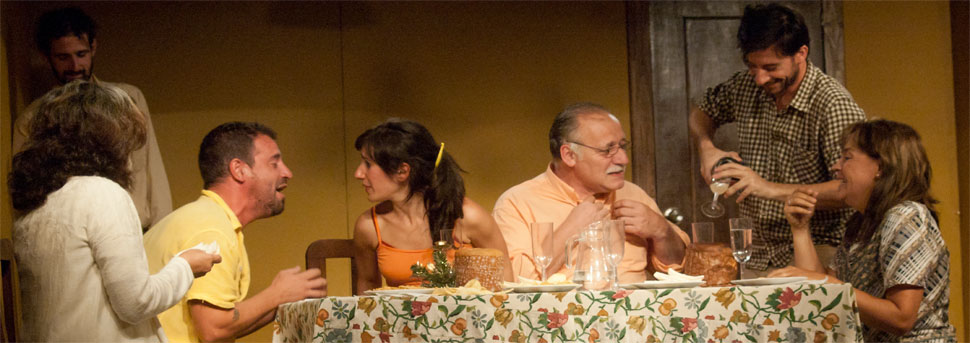text and direction Gabriel Calderón
with Gustavo Saffores, Dahiana Méndez, Alfonso Tort, Marisa Bentancur, Ramiro Perdomo, Diego Artucio, Natalia Acosta
set and light design Pablo Caballero
costumes Pablo Auliso
graphics and web Polder
production Matilde López Espasandín
lenght 1 hour and 20 minutes
national première
in Spanish with English subtitles

Some would say that time can heal anything, that it can bring peace back and fix any problem. What if it had the opposite results? Maybe this is what happens but we are not aware of it. This is the story of a girl whose pain has turned deeper in time, whose need has become more and more pressing as the days passed, whose problem revealed to the people that did not want to hear about it.
This is the story of a family coming together again for Christmas after a very, very, very long time.
A play about confusion and pain
The story includes scenes from the past and the present time. The audience is constantly asked to collect and relate the information about the characters and their common stories. Despite the play focus on some elements of the country’s contemporary history, like dictatorship and its consequences, it also intends to provide an overview on the present condition.
Witnessing the confusion and chaos existing beyond dictatorship is as important as to witness and condemn its crimes. Who is to be blamed for that? When did it all begin? Who was involved into it? What was the role of civil society? What was the citizens’ role? Did a war really happen? Is it possible to cope with this kind of trauma? Should these traumas be overcome? A crucial question that raises elusive answers; though, it should not be confused with somebody’s intention to avoid it.
The Pentalogy
“Uz – el pueblo-“ “Or- tal vez la vida sea ridícula-“ “Ex -que revienten los actores-“. “In” and “At” are still to be written.
These are all parts of a large and overall analysis. These are individual stories, disconnected stories, original stories, stories that – nonetheless – share the same background: the essential right to ask, laugh and cry for the most urgent questions. The main elements of science fiction are employed very precisely when it comes to fantasy literature. For this genre to developed and be appreciated, it is important to include an uncommon element into the ordinary pattern.
This element can be either fantastic, unreal, non-existent or belonging to a very different pattern; though, when it burst into the story, everything is deeply upset. In both science fiction and real stories, when given social contexts like family history, the city or the couple are involved, our ideas are shaken up and, at best, our solid opinions need to be questioned again, from time to time. What is science fiction if not an attempt of questioning what we took for granted, what we thought would never happen? A sort of perpetual question repeating itself in different languages, in different ways, with different backgrounds. The only thing changing is us.


